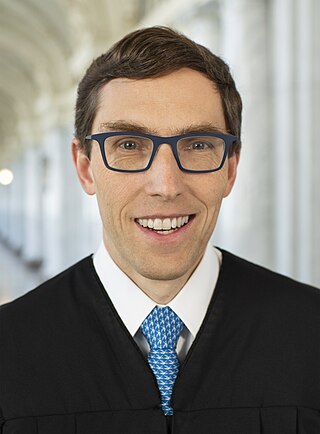In many countries, a mayor is the highest-ranking official in a municipal government such as that of a city or a town. Worldwide, there is a wide variance in local laws and customs regarding the powers and responsibilities of a mayor as well as the means by which a mayor is elected or otherwise mandated. Depending on the system chosen, a mayor may be the chief executive officer of the municipal government, may simply chair a multi-member governing body with little or no independent power, or may play a solely ceremonial role. A mayor's duties and responsibilities may be to appoint and oversee municipal managers and employees, provide basic governmental services to constituents, and execute the laws and ordinances passed by a municipal governing body. Options for selection of a mayor include direct election by the public, or selection by an elected governing council or board.

Frank Hoover Easterbrook is an American lawyer and jurist who has served as a United States circuit judge of the U.S. Court of Appeals for the Seventh Circuit since 1985. He was the Seventh Circuit's chief judge from 2006 to 2013.

The American Bar Association (ABA) is a voluntary bar association of lawyers and law students; it is not specific to any jurisdiction in the United States. Founded in 1878, the ABA's stated activities are the setting of academic standards for law schools, and the formulation of model ethical codes related to the legal profession. As of fiscal year 2017, the ABA had 194,000 dues-paying members, constituting approximately 14.4% of American attorneys. In 1979, half of all lawyers in the U.S. were members of the ABA. The organization's national headquarters are in Chicago, Illinois, and it also maintains a significant branch office in Washington, D.C.

The government of New York City, headquartered at New York City Hall in Lower Manhattan, is organized under the New York City Charter and provides for a mayor-council system. The mayor is elected to a four-year term and is responsible for the administration of city government. The New York City Council is a unicameral body consisting of 51 members, each elected from a geographic district, normally for four-year terms. Primary elections for local offices use ranked choice voting, while general elections use plurality voting. All elected officials are subject to a two consecutive-term limit. The court system consists of two citywide courts and three statewide courts.

Sonia Maria Sotomayor is an American lawyer and jurist who serves as an associate justice of the Supreme Court of the United States. She was nominated by President Barack Obama on May 26, 2009, and has served since August 8, 2009. She is the third woman, first woman of color, the first Hispanic and the first Latina to serve on the Supreme Court.

The government of Florida is established and operated according to the Constitution of Florida and is composed of three branches of government: the executive branch consisting of the governor of Florida and the other elected and appointed constitutional officers; the legislative branch, the Florida Legislature, consisting of the Senate and House; and the judicial branch consisting of the Supreme Court of Florida and lower courts. The state also allows direct participation of the electorate by initiative, referendum, and ratification.
The borough presidents are the chief executives of the five boroughs of New York City. For most of the city's history, the office exercised significant executive powers within each borough, and the five borough presidents also sat on the New York City Board of Estimate. Since 1990, the borough presidents have been stripped of a majority of their powers in the government of New York City.
Mobile v. Bolden, 446 U.S. 55 (1980), was a case in which the Supreme Court of the United States held that disproportionate effects alone, absent purposeful discrimination, are insufficient to establish a claim of racial discrimination affecting voting.

The government of Texas operates under the Constitution of Texas and consists of a unitary democratic state government operating under a presidential system that uses the Dillon Rule, as well as governments at the county and municipal levels.

The government of the U.S. State of Oklahoma, established by the Oklahoma Constitution, is a republican democracy modeled after the federal government of the United States. The state government has three branches: the executive, legislative, and judicial. Through a system of separation of powers or "checks and balances," each of these branches has some authority to act on its own, some authority to regulate the other two branches, and has some of its own authority, in turn, regulated by the other branches.
The government of Virginia combines the executive, legislative and judicial branches of authority in the Commonwealth of Virginia. The current governor of Virginia is Glenn Youngkin. The State Capitol building in Richmond was designed by Thomas Jefferson, and the cornerstone was laid by Governor Patrick Henry in 1785. Virginia currently functions under the 1971 Constitution of Virginia. It is Virginia's seventh constitution. Under the Constitution, the government is composed of three branches: the legislative, the executive and the judicial.
The Commonwealth of Massachusetts is governed by a set of political tenets laid down in its state constitution. Legislative power is held by the bicameral General Court, which is composed of the Senate and House of Representatives. The governor exercises executive power with other independently elected officers: the Attorney General, Secretary of the Commonwealth, and Auditor. The state's judicial power rests in the Supreme Judicial Court, which manages its court system. Cities and towns act through local governmental bodies to the extent that they are authorized by the Commonwealth on local issues, including limited home-rule authority. Although most county governments were abolished during the 1990s and 2000s, a handful remain.

The Atlanta City Council is the main municipal legislative body for the city of Atlanta, Georgia, United States. It consists of 16 members: the council president, twelve members elected from districts within the city, and three members representing at-large posts. The city council is the legislative branch of the Atlanta city government.

The government of North Carolina is divided into three branches: executive, legislative, and judicial. These consist of the Council of State, the bicameral legislature, and the state court system. The Constitution of North Carolina delineates the structure and function of the state government.
The government of Washington State is the governmental structure of the State of Washington, United States, as established by the Constitution of the State of Washington. The executive is composed of the Governor, several other statewide elected officials and the Governor's cabinet. The Washington State Legislature consists of the House of Representatives and State Senate. The judiciary is composed of the Washington Supreme Court and lower courts. There is also local government, consisting of counties, municipalities and special districts.
Nevada Commission on Ethics v. Carrigan, 564 U.S. 117 (2011), was a Supreme Court of the United States decision in which the Court held that the Nevada Ethics in Government Law, which required government officials recuse in cases involving a conflict of interest, is not unconstitutionally overbroad. Specifically, the law requires government officials to recuse themselves from advocating for and voting on the passage of legislation if private commitments to the interests of others materially affect the official's judgment. Under the terms of this law, the Nevada Commission on Ethics censured city councilman Michael Carrigan for voting on a land project for which his campaign manager was a paid consultant. Carrigan challenged his censure in court and the Nevada Supreme Court ruled in his favor, claiming that casting his vote was protected speech. The Supreme Court reversed, ruling that voting by a public official on a public matter is not First Amendment speech.
The Judiciary of California or the Judicial Branch of California is defined under the California Constitution as holding the judicial power of the state of California which is vested in the Supreme Court, the Courts of Appeal and the Superior Courts. The judiciary has a hierarchical structure with the California Supreme Court at the top, California Courts of Appeal as the primary appellate courts, and the California Superior Courts as the primary trial courts.

Eric David Miller is an American attorney and jurist serving as a United States circuit judge of the United States Court of Appeals for the Ninth Circuit.

Andru H. Volinsky is an American politician, attorney, and social justice advocate who served as a member of the Executive Council of New Hampshire from the 2nd district from 2017 to 2021.

In the United States, the president can use the veto power to prevent a bill passed by the Congress from becoming law. Congress can override the veto by a two-thirds vote of both chambers.













